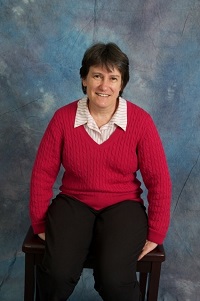Dolce far niente
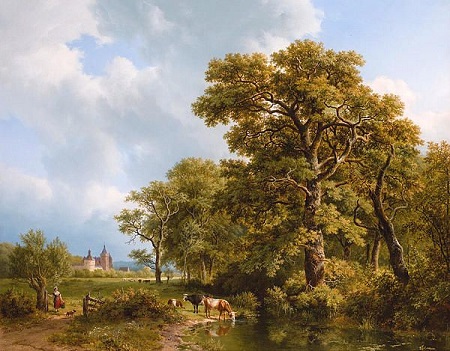
Onder het vee
En toen de zomer dan toch weer was teruggekeerd
en wij dus weer zaten te drinken bij de rivier.
Zijn oude armen bewogen nog, naar daar, die wereld
dat langzame, eeuwige leven van vee in de verte.
Ieder mens zou een dier moeten zijn, moeten sterven
in de herfst, en in de lente weer worden geboren.
Of, ieder mens zou een rivier moeten zijn, komen
zonder verlangen te blijven, gaan zonder heimwee.
Zo zaten we dus weer te drinken daar, tegen de tijd,
oude verhalen, oude jenever, maar de zon ging wel onder.
En hij sliep in. Omdat de wereld insliep. Zwart
zat hij bij de rivier, zwart gat in het uitzicht.
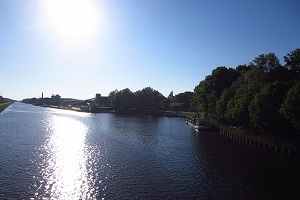
De haven van Goor, de geboorteplaats van Rutger Kopland
De Nederlandse dichter en schrijver Simon Vinkenoog werd op 18 juli 1928 in Amsterdam geboren. Zie ook alle tags voor Simon Vinkenoog op dit blog.
Oponthoud in Rapallo
ik speel ik met een vol gezicht ik
en ik spel ik tussen de woorden door
ik beland in een haven versierd met muziek
en overal is het als ik:
ik woon in de dagen op lange passen
ik kan het stof nog van mijn kleren slaan
en jaja knikken tegen alle deuren
ik kan hier in de lengte door
ik kan van achter van mezelf opaan
ik weet van de zijkanten ik
en ik kan het van voren vragen
aan het rijmelend indecent glas
dat spiegel heet
ik zie het overal aan
ik zie het aan ik en aan het fluisterend
radeloos licht van de zon
en ik zwem nog doorschijnend
door dit vloeibaar dierbaar
eigen andermanse ik
Tenzij de dingen uit zichzelf gaan spreken
een kraan het hoog geluid van liefde fluit
een waterstraal die onverslapte aandacht tikt
een dronken boodschap in de brievenbus
een onverwacht bezoek aan de deur gevonden
de zee die door de straten weifelt
de zon een onbeholpen minnaar op mijn huid
en de doofstomme takken van de bomen
in mijn ogen et cetera
Tenzij ik jaren op je wachten wil
en op je mond het stempel ongeopend druk
als met een zegelring die woorden bloed
en vlijt in de nagels drijft
de handen die niets meer weten
van het feest dat morgen
in de cijfers van het heden
wijdbeens staat geplant
Ver als de horizon ben je
ver als de horizon ben je
in de glazen kist van het weer geborgen
beukend op de blikken deksels
van het najaar
ik zie de bliksem langs je lichaam trillen
en de regen loopt onrustig door je ogen
ik kan de afstand die mij van je scheidt
in lichtjaren tellen
en in de meter van het geluid
zoemen de seconden
mijn handen opnieuw in gebruik gesteld
sluiten het onweer in je borsten buiten
alleen de regen is thuis
op de platte daken van de nachten
zonder duizelingen
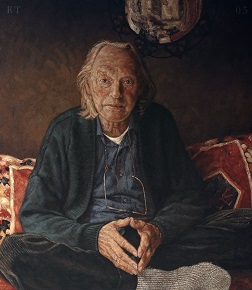
Portret door René Tweehuysen, 2015
De Amerikaanse schrijver en journalist Hunter Stockton Thompson werd geboren in Louisville (Kentucky). op 18 juli 1937. Zie ook alle tags voor Hunter S. Thompson op dit blog.
Uit: Fear and Loathing in Las Vegas
“How long can we maintain? I wondered. How long before one of us starts raving and jabbering at this boy? What will he think then? This same lonely desert was the last known home of the Manson family. Will he make that grim connection when my attorney starts screaming about bats and huge manta rays coming down on the car? If so – well, we’ll just have to cut his head off and bury him somewhere. Because it goes without saying that we can’t turn him loose. He’ll report us at once to some kind of outback nazi law enforcement agency, and they’ll run us down like dogs.
Jesus! Did I say that? Or just think it? Was I talking? Did they hear me? I glanced over at my attorney, but he seemed oblivious – watching the road, driving our Great Red Shark along at a hundred and ten or so. There was no sound from the back seat.Maybe I’d better have a chat with this boy, I thought. Perhape if I explain things, he’ll rest easy.
Of course. I leaned around in the seat and gave him a fine big smile . . . admiring the shape of his skull.“By the way,” I said. “There’s one thing you should probably understand.”
He stared at me, not blinking. Was he gritting his teeth?
“Can you hear me?” I yelled.
He nodded.
“That’s good,” I said. “Because I want you to know that we’re on our way to Las Vegas to find the American Dream.” I smiled. “That’s why we rented this car. It was the only way to do it. Can you grasp that?”
He nodded again, but his eyes were nervous.
“I want you to have all the background,” I said. “Because this is a very ominous assignment – with overtones of extreme personal danger. . . . Hell, I forgot all about this beer; you want one?”
He shook his head.
“How about some ether?” I said.
“What?”
“Never mind. Let’s get right to the heart of this thing. You see, about twenty – four hours ago we were sitting in the Polo Lounge of the Beverly Hills Hotel – in the patio section, of course – and we were just sitting there under a palm tree when this uniformed dwarf came up to me with a pink telephone and said, ‘This must be the call you’ve been waiting for all this time, sir.’”
I laughed and ripped open a beer can that foamed all over the back seat while I kept talking. “And you know? He was right! I’d been expecting that call, but I didn’t know who it would come from. Do you follow me?”
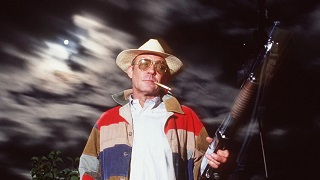
De Duitse dichter en schrijver Steffen Popp werd geboren op 18 juli 1978 in Greifswald. Zie ook alle tags voor Steffen Popp op dit blog.
O elefantischer Pan im Porzellantrakt der Musen
O elefantischer Pan im Porzellantrakt der Musen
hinter den Schleiern suchst du Gesang, übst dich
in Gedanken: »Wir sind
ein Gespräch«, sagst du, »Wir sind
Elefanten«
und bist ganz allein mit diesen Sätzen
einsamer als Dialoge, Dickhäuter
einsamer als die Elektrogeräte des Weltalls
stromsparende Lampen, Wärmepumpen
verwahrlost und hungrig nach Liebe kommen sie
langsam heran aus dem unendlichen Dunkel
an deiner Raumkapsel, ihren geheimen Sprossen
an deinen klugen Händen und Knien
deinen schlafenden Füßen, geträumten Flügeln
reiben sie ihre Felle aus Chrom und Kunststoff …
Die angelernte Hilflosigkeit der Gegenstände
Unmöglichkeit einer Berührung
das Lied, unter seiner Nachtmütze aus Sternen
bewegt es den einsamen Boiler, den irrenden
Ventilator
dein irrendes Auge
auch
in eine Nestgemeinschaft ohne Strom
ohne Gedanken
nur gravitierende Körper, ihre beinahe
staatenbildende Panik vor dem Winter.
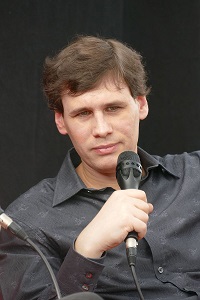
De Noorse schrijver Per Petterson werd geboren in Oslo op 18 juli 1952. Zie ook alle tags voor Per Petterson op dit blog.
Uit: Out Stealing Horses (Vertaald door Anne Born Picador)
“I
too have a dog. Her name is Lyra. What breed she is would not be easy
to say. It’s not that important. We have been out already, with a torch,
on the path we usually take, along the lake with its few millimetres of
ice up against the bank where the dead rushes are yellow with autumn,
and the snow fell silently, heavily out of the dark sky above, making
Lyra sneeze with delight. Now she lies there close to the stove, asleep.
It has stopped snowing. As the day wears on it will all melt. I can
tell that from the thermometer. The red column is rising with the sun.
All my life I have longed to be alone in a place like this. Even when
everything was going well, as it often did. I can say that much. That it
often did. I have been lucky. But even then, for instance in the middle
of an embrace and someone whispering words in my ear I wanted to hear, I
could suddenly get a longing to be in a place where there was only
silence. Years might go by and I did not think about it, but that does
not mean that I did not long to be there. And now I am here, and it is
almost exactly as I had imagined it.
In less than two months’ time
this millennium will be finished. There will be festivities and
fireworks in the parish I am a part of. I shall not go near any of that.
I will stay at home with Lyra, perhaps go for a walk down to the lake
to see if the ice will carry my weight. I am guessing minus ten and
moonlight, and then I will stoke the fire, put a record on the old
gramophone with Billie Holiday’s voice almost a whisper, like when I
heard her in the Oslo Colosseum some time in the 50s, almost burned out,
yet still magic, and then fittingly get drunk on a bottle I have
standing by in the cupboard. When the record ends I will go to bed and
sleep as heavily as it is possible to sleep without being dead, and
awake to a new millennium and not let it mean a thing. I am looking
forward to that.”

De Amerikaanse schrijfster en essayiste Elizabeth M. Gilbert werd geboren op 18 juli 1969 in Waterbury, Connecticut. Zie ook alle tags voor Elizabeth Gilbert op dit blog.
Uit: City of Girls
“I
fell in love with Anthony Roccella, and I’m not going to dillydally
around, pretending that I didn’t. And he fell in love with me too—in his
own way and for a little while at least. Best of all, I managed to fall
in love with him within the space of just a few hours, which is a model
of efficiency. (The young can do that kind of thing, as you must know,
without difficulty. In fact, passionate love, executed in short bursts,
is the natural condition of the young. The only surprising thing was
that it hadn’t happened to me sooner.)
The secret to falling in love
so fast, of course, is not to know the person at all. You just need to
identify one exciting feature about them, and then you hurl your heart
at that one feature, with full force, trusting that this will be enough
of a foundation for lasting devotion. And for me, the exciting thing
about Anthony was his arrogance. I wasn’t the only one who noticed it,
of course—that cockiness was how he got cast in our play, after all—but I
was the one who fell in love with it.
Now, I’d been around plenty of
arrogant young men since arriving in town a few months earlier (it was
New York City; we breed them here), but Anthony’s arrogance had a
special twist to it: he genuinely didn’t seem to care. All the cocky
boys I’d met thus far liked to play at nonchalance, but they still had
an air about them of wanting something, even if it was only sex. But
Anthony had no apparent hunger or longing about him. He was fine with
whatever transpired. He could win, he could lose, it didn’t shake him
up. If he didn’t get what he wanted out of a situation, he would just
stroll away with his hands in his pockets, unfazed, and try again
somewhere else. Whatever life offered, he could take it or leave it.
He
could even take it or leave it when it came to me—so, as you can
imagine, I had no choice but to become completely smitten with him.
Anthony
lived in a fourth-floor walk-up on West Forty-Ninth Street between
Eighth and Ninth Avenues. He lived with his older brother, Lorenzo, who
was the head chef at the Latin Quarter restaurant where Anthony worked
waiting tables when he didn’t have an acting job. His mom and pop used
to live in that apartment too, he told me, but they were both dead now—a
fact that Anthony relayed to me with no evident sense of loss or
sorrow. (Parents: another thing he could take or leave.)
Anthony was
Hell’s Kitchen born and raised. He was pure Forty-Ninth Street, right to
the core. Grew up playing stickball on that very street, and learned
how to sing just a few blocks away at the Church of the Holy Cross. I
came to know that street awfully well in the next few months. I
certainly came to know that apartment awfully well, and I remember it
with warm fondness because it was in his brother Lorenzo’s bed that I
experienced my first climax. (Anthony didn’t have a bed of his own—he
slept on the couch in the living room—but we helped ourselves to his
brother’s room when Lorenzo was at work. Thankfully, Lorenzo worked long
hours, giving me ample time to receive pleasure from young Anthony.)”

De Nederlandse schrijver, criticus en politicus Aad Nuis werd geboren op 18 juli 1933 in Sliedrecht. Zie ook alle tags voor Aad Nuis op dit blog.
Holland
Buiten zwaait de wind uitbundig
wolkendundoek zonnevanen
over een wijde weilanden wereld
over de verre vijandige zee
Binnen wordt mijn hart vakkundig
ingedeeld met oude namen
uitgesloten van de wereld
afgesloten van de zee
Amsterdam, maart
Vandaag kun je de lente ruiken
in het midden van de hoofdstad des lands
De bomen langs de gracht zijn kaal nog
hun stammen zijn stemmig donkerbruin donkergroen
Om de kleinste twijgen een ragdun waas
zo teer als een traan aan een kinderwimper
hetzelfde waas dat bij jonge vrouwen
je stil kan doen worden van eerbied
Daarachter de zon, de blauwe blinkende hemel
en de huizen die door de zon eigenhandig
in de goudgele neonverf zijn gezet
In het snelwisselend water alleen
huivert de winter nog aarzelend weg
als de droom in je ogen des morgens
kort na het ontwaken.
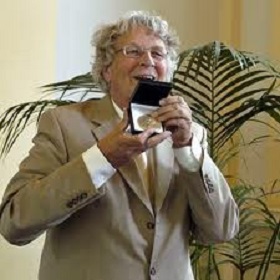
Onafhankelijk van geboortedata
De Australische dichteres en schrijfster Judith Beveridge werd geboren in 1956 in Londen, Engeland. Zie ook alle tags voor Judith Beveridge op dit blog.
Woman and Child
They listen to the myna birds dicker in the grass.
The child’s blue shoes are caked with
garden dirt. When he runs, she sees the antics
of a pair of wrens. She works the garden,
a pot of rusting gardenias has given off its ales
and infused the danker germinations of her
grief. She watches her son chase pigeons,
kick at the leaves piled high. Now, a magpie
adds to his cascades of laughter as he runs with
the hose, pours a fine spray, happy to be giving
to the grass this silver courtship. She sighs,
watches the drops settle in. Today, who
can explain the sadness she feels. Surely this
day is to be treasured: the sun out, the breeze
like a cat’s tongue licking a moon of milk;
her son expending himself in small, public
bursts, happy among clover where bees hover,
and unfold centrefolds of nectar. Today,
who can explain the heaviness in her head, as if
all her worries were tomes toward a larger work,
one she knows she will never finish, but to which
she must keep adding, thought by thought.
She sweeps the petals, smells their russet imprint.
Soon dusk will come with an envoy of smoke
and her son outlast her patience by a rose.
Already he is tiring, puling at the flowers.
It won’t be long before they’ll go in, listen
to the jug purr comfort. He’ll sleep and she’ll
lie back, or get up to unhook the cry of her cat
from the wire door. Now, a few cicadas are idling,
giving each other the gun and a cockatoo calls,
a haughty felon. She sighs, knowing she won’t
escape her mood today, the turned earth
or its rank persuasions; her child’s petulance
flaring like an orchid, or a cockatoo’s unruly crest.
Today, she knows she will need to consider
her unhappiness, of what she is a prisoner – if not
the loss of hope’s particulars. Her son soaks
the path, rinses the sky of its featureless blue.
He is giving that water, now, to everything.
